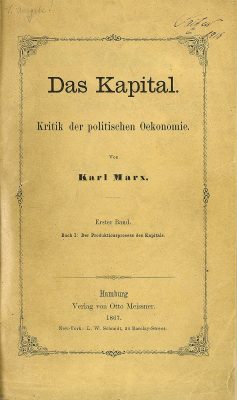Das Kapital is one of the most influential works by the German philosopher Karl Marx. In this work, he discussed in more detail his theories about the capitalist system and how its inherent faults will lead to its inevitable ruin. Das Kapital has three volumes. The first one was published in 1867, while the second and third volumes were published after his death, in 1885 and 1894, respectively, after editing by his collaborator, Friedrich Engels. Marx and Engels had earlier laid down their ideas in The Communist Manifesto, wherein they discussed class conflicts and how the workers would overthrow the dominant class. In Das Kapital, he attempts to establish those ideas in reality and through a scientific approach.
In England, Karl Marx studied the impoverished industrial workers and how they seemingly became mere parts of the new machines that they operated. Marx was disgusted at how industrialization had dehumanized the workplace and forced laborers to work in miserable situations. The working class, or the proletariat, earned little money to continue its existence and was continually abused by business owners and neglected by the state. Marx felt that capitalism would eventually be exposed as an unsteady system if the situation continued. Workers had become like the machines they operated, and the products they created were constantly being separated from them. Capitalists keep all the power and the riches because they own the materials and the factories that generate wealth, while workers continue to languish in poverty. The absence of balance in the system will ultimately lead to the collapse of capitalism. Marx stated that this collapse would certainly happen, but he did not state when it would happen. Marx also did not offer a detailed description of the communist system that he predicted would replace the capitalist system. He only stated that the revolution would finally liberate the workers from their drudgery and poverty.
In the years after Marx’s death, the thoughts contained in Das Kapital and his other works fueled revolutions in China, Russia, and many other nations. Wealthy ruling classes were toppled and their properties taken over by workers. Marx’s theories transformed into an instrument that can explain the world, not just economics, and social structures. The concept of class conflicts that Marx pointed out has started to be utilized in other areas like education, film theory, literary criticism, and ethics. However, his thoughts also became associated with totalitarianism because dictators announced Marx’s ideas as their guiding lights. Many scholars contend that totalitarianism was a misapplication of Marx’s ideas. They point out that in the Soviet Union, government officials simply replaced the bourgeoisie. Nonetheless, the crumbling of the Soviet Union in the 1990s cast doubts on the usefulness of Marx’s ideas, and eventually, his thoughts lost their former attraction. It only gained new momentum when the global financial crisis happened in 2008. The crisis led scholars and historians to think again about Marx’s explanations of capitalism’s in-built flaws and its eventual breakdown.
